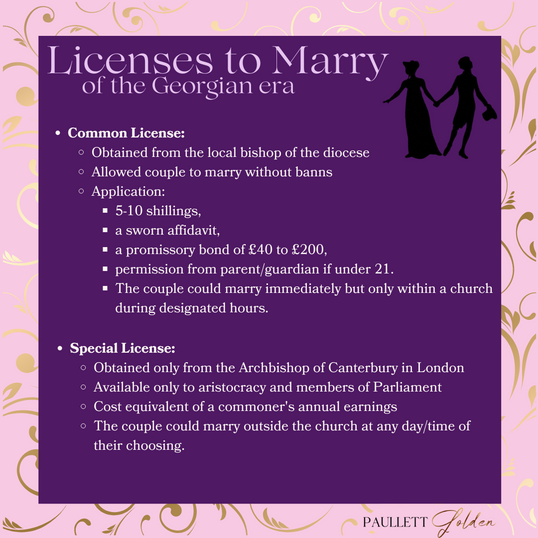Real People. Real Conflict. Real Romance.
Historical Romance
in the style of Jane Austen

License to Marry
A quick comparison of the Common License to the Special License
Do you find it romantic when the hero obtains a license to marry the heroine?
In the reality of the Georgian era, a license was anything but romantic! It meant there was a reason to hide the marriage or rush the marriage.
There were two types of licenses. Which one obtained would depend on the person and circumstances, but 99% of the time, a Common License would be obtained rather than a Special License.
Ideally, the couple would go the route of having the banns read. The banns, however, could be problematic if the marriage was less than savory or needing to be rushed, as the banns took three weeks, must be called in the parish of residency before neighbours and family, and offered those neighbours and family the opportunity to object to the marriage.
To keep the marriage hush hush until all was too late to stop the ceremony, a license could be obtained that would allow the couple to marry immediately. If lord of the manor wished to marry his cook, the license was the way to go. If Mr. Rochester needed to marry Jane Eyre before anyone could object that he was already/still married, a license was the way to do it.
The Common License was the best choice. As long as one had the coin to pay, anyone could obtain this if they filed the appropriate application with the local bishop of the diocese. The bishop of the diocese would be in reasonable travelling distance from one's parish, and the experience would be low stress as long as the bishop was satisfied with the application. A license could only be obtained between two specific people, never purchased “in advance” to have on a rainy day should someone meet a pretty girl in a coaching inn and wish to marry on a whim, and never transferrable to another person. The marriage must still occur within a church, but it did not have to be within the parish of residency, rather any church in which the clergyman was willing to officiate a marriage by license (which might not have been as easy as you think).
The Special License was extraordinarily rare. It was only available to aristocrats and MPs. So expensive, it would cost a year’s earnings and had to be obtained from the Archbishop of Canterbury in London, never from a local bishop. The only benefit to the Special License over the Common License was that it allowed the couple to marry any place, any time, so long as they had a clergyman agree to officiate. Marry in their garden at 2am? Sure! Why not? As long as a clergyman would agree to it, it could happen.
Two additional points of interest on the subject of marriage:
Marriage was by church and church only. Even with a license, a clergyman would need to agree to officiate the marriage. One could not pop down to the "Justice of the Peace" to get hitched.
There were only 4 ways in which to marry: Common license, special license, banns, or elopement. Elopement was tricky because it held no legal standing in England, so if a family wished to ignore that an elopement took place and marry the daughter to someone else, they could do so. They often did not since the girl had already been ruined by eloping, so accepting the marriage was for reputation more than legality. The Church of England was the only one able to marry two people legally.
Clergymen could choose not to marry a couple, so even if a license had been obtained, it did not mean the couple would find a clergyman to officiate the ceremony. In the cities, there would always be a dodgy area that would likely marry anyone who asked, but if the couple were in the rural country, just because they had a license didn't mean a wedding was guaranteed.
There was no such thing as a "marriage certificate" as we have today. The couple signed the parish register so the clergyman could have credit for officiating a wedding, but that was the only documented proof a marriage took place. For wealthier families, if a marriage settlement was drawn up, outlining the dowry, jointure, etc., then that could serve as documented proof of a marriage, but otherwise, there was no marriage certificate or anything similar.
For more detail, check out: https://www.paullettgolden.com/post/special-license
